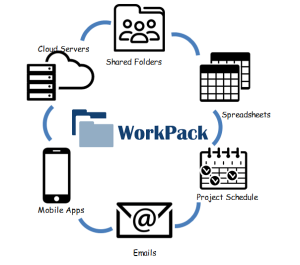Understanding the Significance of Work Packages in Project Management: A Comprehensive Guide for Project Scope Management
Project management is a complex and multifaceted discipline that requires careful planning, execution, and monitoring to ensure successful project delivery. One crucial aspect of project management is the use of work packages, which play a significant role in defining the scope of a project and breaking it down into manageable components, which brings in Work Pack Development.
Importance of Work Packages
Characteristics of a Work Package
A work package is the smallest unit of work in a project that can be individually assigned and monitored. It encompasses a specific set of activities, resources, and deliverables that contribute towards achieving a particular project objective, including related tasks and cost estimates. Work packages should be small enough to be easily managed and completed within a defined timeframe.
Creating a Work Package
Creating a work package involves defining the scope of work, determining the activities required to complete it, identifying the resources needed, and setting clear deliverables and timelines. Project managers play a crucial role in developing work packages that align with the project goals and objectives.
Role of Work Packages in Project Work
Work packages allow project managers to organize and oversee the various parts of a project effectively. By breaking down the project work into manageable components, work packages help assign tasks, track progress, and ensure that all project activities are completed according to plan.
Work Packages in Project Management
Definition and Purpose of Work Packages
A work package is a fundamental building block of the work breakdown structure (WBS) in project management. It represents a specific piece of work that is necessary to achieve project objectives. The purpose of work packages is to divide the project work into smaller, more manageable units that can be easily assigned and monitored.
Work Packages: – Subdivisions of WBS components.
The work breakdown structure (WBS) is a hierarchical decomposition of the project work into smaller, more manageable components. Work packages are created based on the WBS to define the specific tasks, resources, and timelines associated with each element of the project.
Assigning Work Packages to Project Team
Assigning work packages to project team members involves matching the skills and expertise of team members with the requirements of the work package. Practical assignment ensures that tasks are completed efficiently and within the allocated timeframe, contributing to the overall success of the project.
Benefits of Using Work Packages
Project Scope Management with Work Packages
Work packages play a vital role in project scope management by defining the specific scope of work and detailing the activities required to accomplish project goals. Clear scope definition through work packages helps prevent scope creep and ensures that project deliverables are on track.
Monitoring Progress Through Work Packages
Work packages enable project managers to monitor the progress of the work at a granular level. By tracking the completion of individual work packages, project managers can identify potential delays or issues early on and take corrective actions to keep the project on schedule, utilizing their management plan.
Utilizing Earned Value Management in Work Packages
Earned value management (EVM) is a project management technique that integrates scope, cost, and schedule to assess project performance, a vital aspect of the project management plan. Work packages serve as the basis for EVM calculations, allowing project managers to measure the earned value of completed work and compare it against planned costs and schedules.
Development and Management of Work Packages
Project Planning and Work Package Development
Effective project planning is essential for the development of work packages. Project managers need to define project objectives, identify project requirements, and create a detailed work breakdown structure before developing individual work packages that align with the project goals.
Creating Manageable Work Packages
Creating manageable work packages involves breaking down the project work into logical and achievable components. Work packages should be well-defined, specific, and small enough to be easily assigned, monitored, and completed by project team members within the project’s constraints.
Allocating Work Packages in the Project Schedule
Allocating work packages in the project schedule requires careful consideration of resource availability, task dependencies, and project deadlines. By integrating work packages into the project schedule, project managers can effectively plan and coordinate project activities to ensure timely project delivery, incorporating a comprehensive project management plan.
Enhancing Project Efficiency with Work Packages
Utilizing Work Packages for Deliverable Management
Work packages help in managing project deliverables by defining the required outputs, resources, and activities for each work package. By clearly outlining deliverables within work packages, project managers can ensure that project milestones are met and deliverables are completed as per the project requirements.
Role of Work Packages in Project Team Collaboration
Work packages promote collaboration among project team members by clearly defining individual responsibilities and tasks. Assigning work packages allows team members to work cohesively towards a common goal, share information, and coordinate their efforts to achieve project success.
Significance of Every Work Package in Larger Project Management
Every work package contributes to the overall success of a project by focusing on a specific aspect of the project work. When integrated into the larger project management framework, work packages help organize project activities, track progress, and ensure that project objectives are met within the defined scope, schedule, and budget.
FAQS
What is Work Pack Development and How Does It Fit into a Project Management Plan?
Work Pack Development is the process of creating comprehensive packages or plans that outline the scope, objectives, resources, timeline, and other vital details necessary for the successful execution of specific tasks or activities within a project.
Why is Work Pack Development Important?
Work Pack Development is essential for effective project management as it provides a structured framework for planning, organizing, and executing tasks. It helps minimize risks, optimize resource utilization, and ensure clarity and alignment among project stakeholders, serving as a vital component of the project management plan.
Who is Involved in Work Pack Development?
Work Pack Development typically involves project managers, subject matter experts, team leaders, and other relevant stakeholders who contribute their expertise in defining scope, allocating resources, and establishing timelines for the tasks at hand.
What are the Key Components of a Work Pack?
The critical components of a work pack include:
Scope Definition: Clearly define the objectives, deliverables, and constraints of the tasks.
Resource Allocation: Identifying and allocating workforce, equipment, materials, and budget required for the tasks.
Task Breakdown Structure: Breaking down complex activities into smaller, manageable components.
Timeline and Milestones: Establishing a realistic timeline with well-defined milestones for tracking progress.
Risk Assessment and Mitigation: Identifying potential risks and developing strategies to mitigate them as part of a comprehensive project management plan.
How is Work Pack Development Different from Project Planning within the Context of a Project Management Plan?
Work Pack Development is a subset of project planning that focuses on creating detailed plans for specific tasks or activities within a project. At the same time, project planning involves broader aspects such as defining project goals, stakeholders, and overall strategy. Work Pack Development drills down into the specifics of individual tasks, forming a crucial part of the management plan.
How Often Should Work Packs be Reviewed and Updated?
Work Packs should be reviewed and updated regularly throughout the project lifecycle, according to the management plan. Depending on the project’s duration and complexity, work packs may undergo revisions on a weekly, bi-weekly, or monthly basis to ensure alignment with evolving project requirements and changes, as outlined in their management plan.
What Tools or Software are Used for Work Pack Development?
Work Pack Development can be facilitated by various project management tools and software, such as Microsoft Project, Primavera P6, Asana, Trello, and others. These tools provide features for task management, resource allocation, timeline planning, and collaboration among team members, enhancing the effectiveness of the management plan.
How Can I Ensure Effective Communication During Work Pack Development?
Effective communication is crucial during Work Pack Development. Utilize regular meetings, progress reports, and collaborative platforms to ensure that all stakeholders are informed about the progress, changes, and challenges related to the work packs. Encourage open dialogue and address any concerns or questions promptly.
What Should I Do if Unexpected Changes Arise During Work Pack Execution, Affecting the Entire Project
In the event of unexpected changes or disruptions during Work Pack execution, assess the impact on the project timeline, resources, and objectives. If necessary, revise the work pack accordingly, update stakeholders, and implement mitigation strategies to minimize the impact on project deliverables and deadlines.
How Can I Improve Work Pack Development Processes in My Organization by Integrating a Project Management Plan?
To improve Work Pack Development processes, organizations can implement continuous improvement practices, solicit feedback from project teams, conduct post-project reviews to identify lessons learned and invest in training programs to enhance project management skills among team members. Additionally, leveraging technology and automation tools can streamline the Work Pack Development process and improve efficiency, which is integral to the project management plan.
Contact Us
Ready to enhance your project management with our Work Pack Development services? Contact us today to discuss your project’s unique requirements and learn how our expertise can streamline your projects for success.

